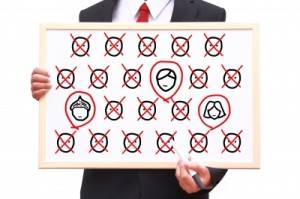Doing well in a job interview is not a science. Connecting with your interviewer, showing your positive personality traits, and proving that you are the right person for the job is not a simple process that can be copied and pasted time and again. Much of it is chemistry and getting on with people -= after all who would hire someone they didn’t like? In fact liveability is essential unless you have a monopoly on something essential to the employer. Which is generally a hypothetical case.
 So what are the other things that individually can affect your performance in a job interview? Screw up on all of them an you just book a seat at the job centre. So..
So what are the other things that individually can affect your performance in a job interview? Screw up on all of them an you just book a seat at the job centre. So..
What not to do in a job interview:
1. Be unprepared
Always bring copies of your CV, cover letter, and relevant qualifications. Research the company, its ethos, and its plans for the future will always be a positive. There is literally no such thing as being over-prepared for a job interview – visible preparation and effort can swing the balance your way.
2. Give a bad handshake
A bad handshake can taint the first impression of you. Offer a confident and strong handshake, while maintaining eye contact and smiling. Some people don’t notice these things – but for those that do, its a deal breaker.
3. Dress inappropriately
Again, your appearance and what you wear when you walk through the door shape the interviewer’s first impression of you. Being dressed too casually will make you look like you are not taking the interview seriously. When in doubt, be overdressed, not underdressed. In fact, there is no such thing as overdressed.
4. Forget about your body language
Slouching, fidgeting, looking bored and uninterested, or not maintaining eye contact may lose you the job. Carefully consider what your body language says about you. You want to look engaged, attentive and friendly throughout the interview. If there are two interviewers – one may be asking questions while the other assesses the non-verbal noises you are making.
5. Not bothering to follow up
A company may interview tens, maybe hundreds, of people for a job. Who is the interviewer more likely to remember, the candidate who sent a follow up thank you email, or one who did not? A follow up email (or even better a letter – handed in at reception as you leave!) does not need to be long, but makes a huge differentiating impact. Stand out and be hired
Image courtesy of pakorn / FreeDigitalPhotos.net
